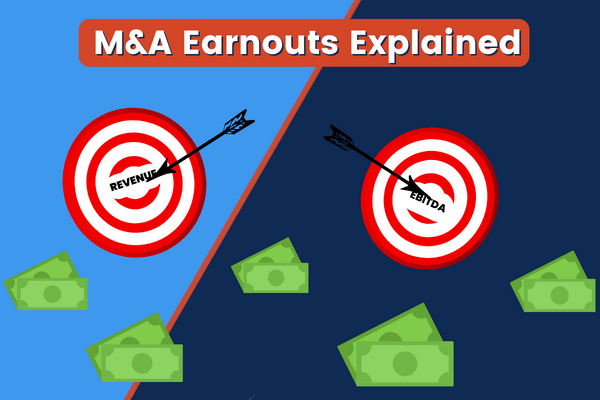Mergers and acquisitions (M&A) are an essential part of any business’s growth strategy. However, there is often a degree of risk involved in pursuing deals. Therefore, some acquirers will attempt to mitigate risk by offering alternative streams of revenue known as an earnouts.
In this article, we’ll explore what an earnout is, how they work, the risks involved, as well as their tax consequences.
What Is an Earnout?
An earnout is a financial method used in M&A transactions in addition to the upfront purchase price.
While it could be seen as a clear incentive for a company that wants to either sell itself to another company or go public, it also carries several risks.
Earnouts can also be beneficial if both parties have difficulty finding common ground on the initial purchase price.
This strategy bridges the valuation gap between what the seller believes the company is worth and how much the buyer is willing to pay.
It’s a one-time payment to the seller that is contingent on the seller merging with the acquirer.
It’s almost always offered as an incentive for a company to either sell its assets to a private equity investor or go public.
Both the seller and the acquirer have interests that are aligned in a deal like this. The seller wants to cash out, while the acquirer wants to acquire the assets.
The acquirer’s interest is to acquire assets at a lower price than what they’d earn if they had to go out and find new customers.
The seller’s interest is to cash out, so they get the amount of money they’re entitled to in exchange for their shares or assets.
How Earnouts Work In M&A Deals?
Typically, the seller of an acquisition firm will negotiate an earnout clause with the acquirer.
The earnout will state the amount, terms, and conditions that the seller and acquirer must meet for the seller to get the money they’re entitled to.
When it comes to the purchase offer and buyout offers, the earnout clause will specify which occurs and when the earnout is triggered.
Additionally, in the event of a buyout offer, the earnout clause will state when the earnout is triggered if the seller decides to accept the buyout offer.
When Are Earnouts Used?
Typically, 1% of public-target M&A deals include earnouts compared to 14% of private-target acquisitions.
Publicly held companies must provide transparency regarding financial information to their shareholders as a basic regulatory requirement.
On the other hand, a private company with a smaller shareholder base may be able to disclose important information during the due diligence process.
The inclusion of earnouts can reduce the buyer’s risk of information asymmetry.
Earnouts can also be used when the purchase price negotiations are at a deadlock between the two parties, but this isn’t the only situation where they can be beneficial.
The buyer may decide to include earnouts in the transaction to ensure the company’s surviving management and shareholders continue working towards the same objective.
While the seller may also request earnouts to ensure they’re properly compensated if the business increases in value.
Earnouts are primarily used in sectors such as startups, where cash flow may be uncertain.
The Risks of an Earnout Clause
There are a few major risks that both buyers and sellers need to be aware of when using earnouts in M&A transactions.
First, sellers are incentivized to “overpromise” and “over earn” by promising higher post-acquisition performance than might be realistic.
This may lead to sellers setting unattainable targets, which will cause them to walk away with more money at the end of the deal. This risk is compounded by the fact that earnouts are a one-way street.
In other words, buyers don’t have to pay anything even if they miss the target. That’s why it’s important to include a “claw-back” provision in your earnout.
Need Help with Your M&A Deal?
M&A deals can be a lucrative way to generate cash for your business, provided you’re willing to take on some level of risk.
If you’re confident in your company’s ability to exceed expectations, an earnout can be a great way to keep your initial investment low and mitigate your risk.
Before determining your earnout, consult with a skilled M&A attorney to discuss what’s right for you and your business.




